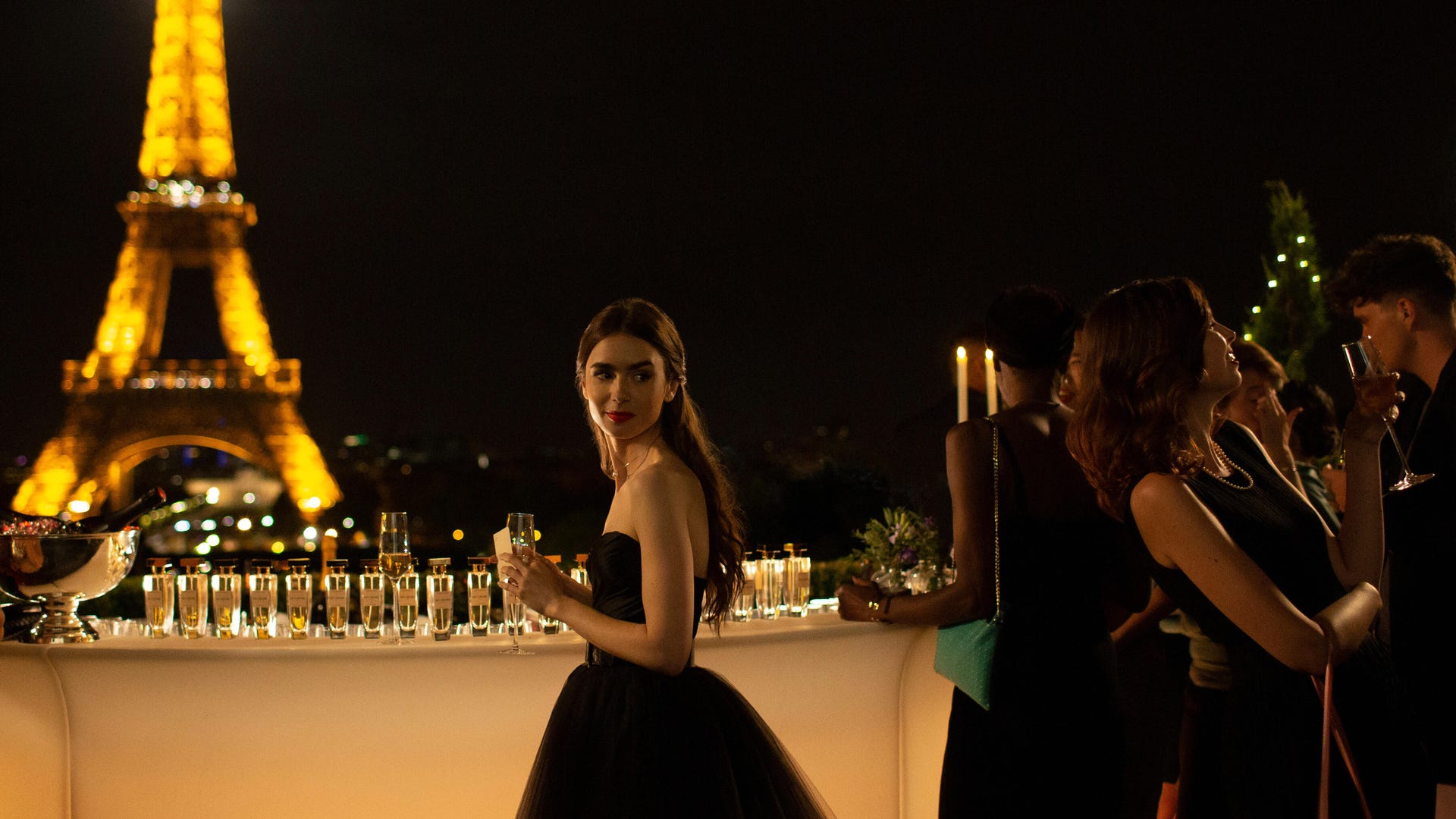Join or Sign In
Sign in to customize your TV listings
By joining TV Guide, you agree to our Terms of Use and acknowledge the data practices in our Privacy Policy.
Emily in Paris Review: Netflix Chose the Worst Time for a Rom-Com About How Great Americans Are
Darren Star's new series is completely watchable, but feels out of touch with reality
There is definitely an audience for Netflix's new escapist romantic comedy Emily in Paris -- and with just 10 30-minute episodes, it won't take much time to devour the first season -- but while the Darren Star-created series about an American expatriate living in Paris has its moments, we've also seen it before.
The series, which is now streaming on Netflix, stars Lily Collins as Emily Cooper, an ambitious millennial from Chicago with a master's degree in marketing who is exceptionally skilled at social media and is meant to bring an American perspective to the French firm her company recently acquired. But much like Liza Miller (Sutton Foster), the protagonist of Star's TV Land series Younger, or Jane Sloan (Katie Stevens) of Freeform's millennial drama The Bold Type, Emily is too confident, if that's possible, and a little too good at her job. She briefly faces setbacks at work but they are always artificial, as Emily is savvy and brilliant enough to work her way out of any jam and come out on top in the end, no matter the situation, whether she has offended a potential client or lost a $2 million Euro watch after a movie star disappeared.
End your browsing nightmare with TV Guide's recommendations for every mood
Emily also frequently upstages her superiors in ways that feel, for lack of a better word, unrealistic, and while I'm not sure that will matter to everyone -- it is a rom-com, after all -- a heroine who shows up everyone, who comes out of every scrape unscathed, who manages to find success around every corner, and who regularly has doors opened to her, makes for a TV show that repeats itself over and over without any personal growth. It also feels out of touch with the state of the real world. It's not to disparage Emily's seemingly hard-earned success (though it must be said that the fact she got the job at all was because her boss became pregnant and for some reason that meant she couldn't move to France), but with so many people in her age group continuing to struggle to have a career -- hell, to have a savings account and/or retirement plan -- after entering the workforce during the 2008 financial crisis, it's difficult as a millennial woman in 2020 to relate to someone like Emily, who feels like the romantic embodiment of the adage that if you work hard enough, you'll be successful. Sometimes hard work doesn't translate to success.

Lily Collins, Emily in Paris
Carole Bethuel/NetflixTo its credit, though, the series does at least attempt to address the side of Emily that is obsessed with work to the point it seems to determine who she is as well as her self-worth. It's a very American thing to work one's self to the bone to be the best and find pleasure in doing that work at the cost of one's life, but that's not the case in France (or in many other countries). However, the series doesn't quite go far enough to investigate Emily's inherent Americanness -- or help her let go of some of its more negative aspects.
Emily in Paris portrays Emily -- and therefore Americans -- as arrogant (or perhaps ignorant), unnecessarily loud, overly ambitious, and self-centered. And while that is certainly the view many around the world have of Americans (and is true of plenty of Americans as well), the series does little to attempt to change that perception. In fact, you can argue it actually goes out of its way to say that Emily's so good at her job because she's American and that her new firm needs her and her American point of view to survive, which feels woefully out of touch with reality, especially because the firm isn't specifically marketing to American consumers.
Discover your new favorite show: Watch This Now!
While this is misguided, where this American-centric point of view really becomes an issue is Emily's disinterest in her new home. When she first arrives in Paris, she speaks no French, and by the end of the first season, that hasn't changed much. And she doesn't even seem particularly bothered by the fact she's been living in Paris for what appears to be months and still can't communicate with those around her and relies on others to help her or, even worse, expects them to speak English to accommodate her. Learning French and appreciating French culture and customs seems to be low priority for Emily, despite the fact she is seen taking a language course early on, and not only is her disinterest disrespectful and further perpetuates the idea that Americans believe they're better than everyone else and shouldn't have to change or adapt to fit the world around them, it also immediately creates a barrier between her and everyone she encounters.
If you can get past these issues, though, there is still a lot to like about Emily in Paris, including the city of Paris itself. The series was filmed on location, which adds authenticity to the show. And it doesn't take the point of view that most films and TV series take of Paris -- although there is plenty of B-roll featuring the city skyline and and a few scenes show iconic Paris locations and monuments like the Eiffel Tower or Place Vendôme, with its column and statue of Napoleon, we mostly experience Paris as Emily does: in narrow, cobblestone streets, outside cute cafés, and on tree-lined avenues. It's lovely and lends a certain je ne sais quoi to the whole affair. Although it sometimes makes it feels like Emily could be anywhere, it's hard to fault the show for attempting to portray Paris as a big city that feels more like a small town, as Camille (Camille Razat), one of Emily's new friends, describes it at one point.

Lily Collins, Emily in Paris
Carole Bethuel/NetflixOther highlights of the show include Philippine Leroy-Beaulieu as Sylvie, Emily's boss who remains largely unimpressed by Emily throughout the first season but with whom Emily regularly tries to form a bond. Leroy-Beaulieu brings a sense of strength and wisdom to Sylvie, the kind that comes with age and life experience and therefore the ones Emily does not yet possess, and in doing so, she brings a certain gravitas to the series as well. And because Sylvie is not outright malevolent in her approach to Emily, she also doesn't operate within the antagonist space the way other projects might have her do.
Balancing that out is Emily's friend Mindy (Ashley Park), who is from China but attended junior high in Indiana and is now working as a nanny in Paris. Mindy is a larger-than-life character and is, in some ways, the same as Emily: an outsider living in Paris. However, Mindy is experiencing the city in a way Emily is not -- she embraces the culture and the French people, and maybe it's because she's Chinese and not American (despite the accent) that she's more easily able to insert herself into this life and adapt to a new existence. Whatever it is, Mindy is a much-needed breath of fresh air.
Which brings me to Gabriel (Lucas Bravo), Emily's downstairs neighbor and obvious love interest. Their burgeoning relationship is the real draw of the series, since it is, of course, a romantic comedy at heart. It is clear from the moment the two meet when Emily attempts to enter the wrong apartment after miscounting the floors in her building that the two will embark on some sort of flirtation and probably, hopefully, a romance worthy of the streets of Paris itself.
Gabriel is an up-and-coming chef at the restaurant across the street from their apartment building, and he is exactly as charming as you'd expect from the romantic lead of a romantic comedy set in one of the most romantic cities in the world. I don't dare spoil the ups and downs of their relationship here -- where's the fun in that? -- but it's fair to say that although I didn't appreciate some of the tropes Star and the writers used to throw up roadblocks between Emily and Gabriel, I still breezed through the series and their story chasing that happy ending.
Because that's what rom-coms are for, right? We watch them precisely because there is a recognizable formula that will ultimately make us believe in true love and happily ever afters. So even if Emily in Paris is a bit misguided and features familiar narrative beats to the point it is something we've all seen before -- and it definitely is; hell, you can even argue it's the same show Star always produces -- romance ultimately never goes out of style.
TV Guide rating: 3/5
Emily in Paris is now streaming on Netflix.
